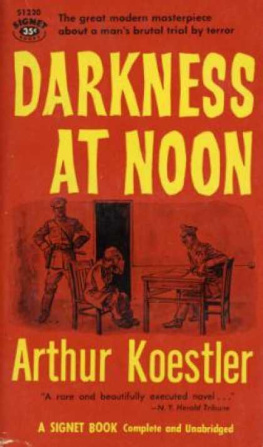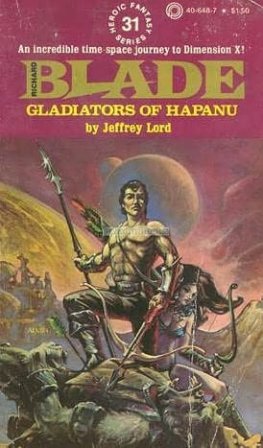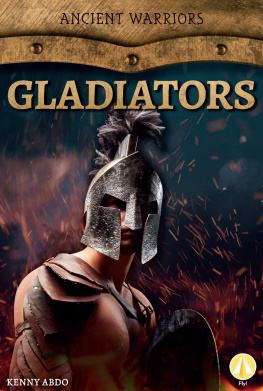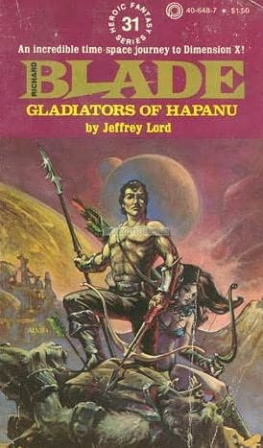Arthur Koestler - The Gladiators
Here you can read online Arthur Koestler - The Gladiators full text of the book (entire story) in english for free. Download pdf and epub, get meaning, cover and reviews about this ebook. genre: Detective and thriller. Description of the work, (preface) as well as reviews are available. Best literature library LitArk.com created for fans of good reading and offers a wide selection of genres:
Romance novel
Science fiction
Adventure
Detective
Science
History
Home and family
Prose
Art
Politics
Computer
Non-fiction
Religion
Business
Children
Humor
Choose a favorite category and find really read worthwhile books. Enjoy immersion in the world of imagination, feel the emotions of the characters or learn something new for yourself, make an fascinating discovery.
- Book:The Gladiators
- Author:
- Genre:
- Rating:5 / 5
- Favourites:Add to favourites
- Your mark:
- 100
- 1
- 2
- 3
- 4
- 5
The Gladiators: summary, description and annotation
We offer to read an annotation, description, summary or preface (depends on what the author of the book "The Gladiators" wrote himself). If you haven't found the necessary information about the book — write in the comments, we will try to find it.
The Gladiators — read online for free the complete book (whole text) full work
Below is the text of the book, divided by pages. System saving the place of the last page read, allows you to conveniently read the book "The Gladiators" online for free, without having to search again every time where you left off. Put a bookmark, and you can go to the page where you finished reading at any time.
Font size:
Interval:
Bookmark:

THE
GLADIATORS
They were purchased as raw material in the slave markets. They were quartered in cages, were trained and exercised and disciplined until their thin, ravaged bodies became superb fighting equipment. Then they were set against each other, naked, with spears and nets and bare hands to fight to the death...
THE
GLADIATORS
They lived, suffered and died to please, divert and titillate the Roman public...
Books by Arthur Koestler
Darkness At Noon
Scum of the Earth
Arrival and Departure
The Yogi and The Commissar
Twilight Bar
Thieves in the Night
Insight and Outlook
The Structure of a Miracle
Age of Longing
Promise and Fulfillment
Arrow in the Blue
The Invisible Writing
THE GLADIATORS
BY ARTHUR KOESTLER
TRANSLATED BY EDITH SIMON
'When we had passed the
gate, I pulled my hat down
over my eyes and wept a
little; and no one saw it.'
SILVIO PELLICO
BANTAM BOOKS NEW YORK
This low-priced Bantam Book has been completely reset in a type face
designed for easy reading and was
printed from new plates. It contains the complete
text of the original hard-cover edition.
NOT ONE WORD HAS BEEN OMITTED.
THE GLADIATORS
A Bantam Book I published by arrangement -with The Macmillan Company
PRINTING HISTORY
Macmillan edition published July 1939
Reissued in 1947 Bantam edition published March 1962
Copyright, 1939, by The Macmillan Company.
All rights reserved no part of this book may be reproduced in any
form without permission in writing from the publisher, except by a
reviewer who wishes to quote brief passages in connection with a
review written for inclusion in magazine or newspaper.
For information address The Macmillan Company,
60 Fifth Avenue t New York 11, N. Y. Published simultaneously in the United States and Canada,
Bantam Books are published by Bantam Books, Inc. Its trade-mark t consisting of the words "Bantam Books" and the portrayal of a bantam, is registered in the United States Patent Office and in other countries. Marca Registrada. Printed in the United States of America. Bantam Books, Inc., 271 Madison Ave., New York 16, N. Y.
CONTENTS
BOOK ONE RISE
BOOK TWO THE LAW OF DETOURS
BOOK THREE THE SUN STATE
TO REMAIN 197
BOOK FOUR DECLINE
Interlude: The Dolphins
Epilogue: The Dolphins
The events historically known as the Slave War,
or Gladiators' War, took place during the years
71 before Christ
PROLOGUE
THE DOLPHINS
IT is night still.
Still no cock has crowed.
But Quintus Apronius, First Scribe of the Market Court, is used to the fact that clerks have to be earlier risers than cocks. He groans as his toes fish for the sandals on the grimy wooden floor. Once again the sandals stand the wrong way, toes facing the bed: the young day's first offence; how many more are to come?
He shuffles along to the window, looks down into the courtyard, a deep shaft surrounded by five stories. A bony old woman comes climbing up the fire escape: Pomponia, his housekeeper and only slave, brings breakfast and the pail of hot water. She is punctual, he will say that for her. Punctual, old and bony.
The water is lukewarm, breakfast awful: second vexation. But then the Dolphins swim across his mind, the anticipation of his day's splendid climax chases a smile across his face. Pomponia prattles and nags as she bustles about the room, brushing his clothes, helping to adjust the complicated pleats of his clerk's habit. In worried dignity he descends the fire escape, cautiously snatching up his gown, that its hem may not sweep the rungs; he knows that, broom in hand, Pomponia is watching him from the window.
It dawns. Still holding on to his robe, he edges along the houses, for a continuous train of ox- and horse-carts migrates through the narrow alley, with much rumbling and gee-ups: the Driving of Vehicles Through the Streets of Capua During the Day is Strictly Prohibited.
A group of workmen is coming towards him along the street that divides the perfume- and ointment-stalls from the fishmarket. They are municipal slaves, ruffians staring woodenly with unshaven faces. Harassed, he flattens himself still closer to the housefront, gathers his cloak, mutters with scorn. The slaves march past, two of them jostle against him, unmindful and unrepentant. The Scribe quivers with rage, yet he dare not say anything: the men are unshackledcursed newfangled slacknessand the overseers dally far behind the gang.
At last they have all passed, Apronius may go on his way; but his day is spoilt. Times are growing more and more menacing, it is five years since Great Dictator Sulla's death, and once more the world is off its hinges. Sulla, that was a man for you, he knew how to keep order, how to crush the rabble with an iron heel. A whole century's revolutionary unrest had preceded him: the Gracchi with their mad plans of reform, the horrible slave risings in Sicily, the terror of a mob let loose when Marius and Cinna armed the slaves of Rome and sent them out against the Aristocrats' Party. World civilization rocked in its foundations: slaves, blunted, stinking crowds, threatened to take power, posed as the lords of To-morrow. But lo! came Sulla, the saviour, and took the reins in his hand. And he shut the People's Tribunes' mouths for them, cut off the most rebellious heads, drove the leaders of the People's Party into exile, to Spain. He abolished the gratuitous distribution of grain, prize for idlers and loafers; he gave to the people a new, severe constitution to last for thousands of years to come, for the duration of time; after that unfortunately the lice got hold of Great Sulla and ate him up. Which they call Phthiriasis.
Only five yearsyet how distant were those goodly times! Again the world is threatened and troubled, again there is free corn for lazybones and loiterers; People's Tribunes and demagogues may once more hold forth with their bloodcurdling speeches. Bereft of its leader, the nobility compromises, vacillates; and once more the rabble rears its head.
Quintus Apronius, First Scribe of the Market Court, feels that his day is definitely spoilt; thinking of the Dolphins even, splendid climax of his day, fails to cheer him. A wooden hoarding attracts his gaze; scriptors are busy adorning it with a new announcement. It is a very grand announcement, nearly finished: on top is painted a crimson sun with many rays bristling in all directions. Underneath, Director Lentulus Batuatus, owner of the city's greatest school of gladiators, is proud to invite the gracious Capuan public to a super-performance. The festival will take place the day after to-morrow in any weather, for the director Batuatus, heedless of enormous expense, will have awnings spread over the arena, designed to keep possible rain, not to mention sun, off the honoured public. Moreover, perfume will be sprayed throughout the auditorium during the intervals.
'Quake and hurry thither, ye lovers of festive games, esteemed citizens of Capua; ye who witnessed the feats of a Pacidejanus, winner in a hundred and six combats, ye who once admired invincible Carpophore, do not miss this singular opportunity of seeing the famous fighters from Lentulus Batuatus's school fight and die....'
Follows the lengthy list of the performing teams, the main feature being a fight between the Gallic gladiator Crixus and the Thracian ring-bearer Spartacus. The notice further announces that one hundred and fifty novices will duel AD GLADIUM, that is, man against man; one hundred and fifty more AD BESTIARIUM, man against beast. During the noon-interval, and while the arena is disinfected, dwarfs, cripples, women and clowns are to fight mock-duels. Tickets from three Asses to fifty Sestertii may be booked in advance at Titus's bakery, in the open-air baths of Hermios, as well as from the authorized agents who may be found at the entrance to the Minerva Temple.
Next pageFont size:
Interval:
Bookmark:
Similar books «The Gladiators»
Look at similar books to The Gladiators. We have selected literature similar in name and meaning in the hope of providing readers with more options to find new, interesting, not yet read works.
Discussion, reviews of the book The Gladiators and just readers' own opinions. Leave your comments, write what you think about the work, its meaning or the main characters. Specify what exactly you liked and what you didn't like, and why you think so.












